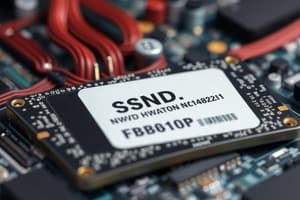Podcast
Questions and Answers
What type of storage device is a solid-state drive (SSD)?
What type of storage device is a solid-state drive (SSD)?
- Mechanical storage device
- Hybrid storage device
- Solid-state storage device (correct)
- Virtual storage device
How do SSDs differ from hard disk drives (HDDs)?
How do SSDs differ from hard disk drives (HDDs)?
- SSDs use more power than HDDs
- SSDs have slower input/output rates than HDDs
- SSDs have higher physical shock resistance
- SSDs lack physical spinning disks and movable read-write heads (correct)
What is the advantage of SSDs over HDDs in terms of physical characteristics?
What is the advantage of SSDs over HDDs in terms of physical characteristics?
- HDDs produce less heat
- HDDs are lighter in weight
- SSDs have larger physical dimensions
- SSDs are typically more resistant to physical shock (correct)
What determines the properties of SSD storage devices?
What determines the properties of SSD storage devices?
What type of cells are generally the most reliable, durable, fast, and expensive in SSDs?
What type of cells are generally the most reliable, durable, fast, and expensive in SSDs?
Flashcards are hidden until you start studying
Study Notes
Solid-State Drives (SSDs) Overview
- SSDs are a type of non-volatile storage device that uses NAND flash memory to store data.
- Unlike traditional mechanical hard disk drives (HDDs), SSDs have no moving parts, allowing for faster data access and improved reliability.
Key Differences Between SSDs and HDDs
- SSDs provide significantly faster data read and write speeds compared to HDDs, leading to quicker system boot times and file transfers.
- HDDs use spinning disks and a read/write head, making them slower and more susceptible to physical damage from movement.
- SSDs consume less power, improving battery life in portable devices.
Advantages of SSDs in Physical Characteristics
- The absence of moving parts in SSDs results in lower noise levels, less heat generation, and a lighter overall weight compared to HDDs.
- SSDs are more compact and can fit in smaller physical spaces, enhancing design flexibility for modern electronics.
Determinants of SSD Properties
- The type of NAND flash memory (e.g., SLC, MLC, TLC, QLC) influences endurance, speed, and capacity of SSDs.
- Controller technology impacts read/write performance and the efficiency of data management processes.
Cell Types in SSDs
- Single-Level Cell (SLC) technology is known for being the most reliable, durable, and fastest, but also comes at a higher cost.
- SLC stores one bit of data per memory cell, reducing error rates and increasing performance compared to Multi-Level Cell (MLC) and other types.
Studying That Suits You
Use AI to generate personalized quizzes and flashcards to suit your learning preferences.




